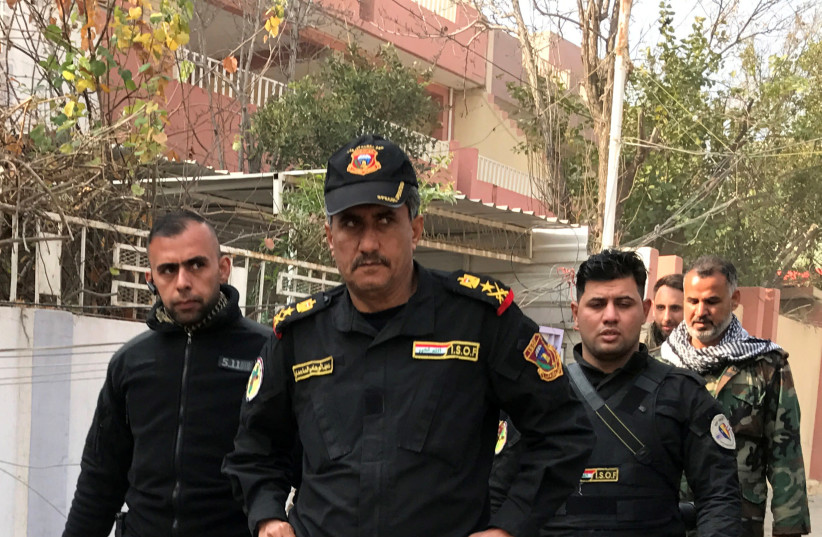Iraq’s new government has won praise from Washington, Tehran and Riyadh, in an unusual display of unity by regional governments that don’t get along.
SETH J. FRANTZMAN

Lt.-Gen. Abdu-Wahab al-Saadi is one of Iraq’s favorite commanders, a hero of the wars on ISIS and a key member in the counter-terrorism service. Sidelined last year by second-rate politicians in Baghdad who may have been jealous of his standing, he has now been returned to his post by the new prime minister, Mustafa al-Kadhimi, in one of his first actions.
Saadi was a key face during the war on ISIS, praised for his modesty and spending time at the front with his men. He was seen as one of the few positive and reliable faces to come out of Iraq’s security forces after it had met with catastrophe in 2014 when ISIS took over most of the Sunni Arab areas of the country. Saadi was removed in September and his removal helped fuel anger at Baghdad that resulted in mass protests in October.
The return of Saadi to the Counter-Terrorism Service in Iraq is seen as a momentous decision that could bring stability. Iraq’s new government has won praise from Washington, Tehran and Riyadh, in an unusual display of unity by regional governments that don’t get along, but which all share an interest in the future of Iraq. The new Baghdad leader, Kadhimi, is a former activist and intelligence chief. The tapping of Saadi comes as the prime minister also seeks to release protesters.
The protests that began in October led to brutal suppression by Iranian-backed militias, who gunned down the activists. Eventually, so many protesters were killed – around 500 – that then prime minister Adel Abdul-Mahdi resigned in November. His resignation opened the door for Iran to operationalize its attempt to hijack Iraq and use it as a springboard to strike the US and as a conduit for weapons to Syria and Hezbollah.
Ballistic missiles were sent to Iranian-backed militias in Iraq, and one of those militias, Kataib Hezbollah, fired rockets that killed four members of the US-led coalition. In three waves of airstrikes, the US responded from December 2019 to March 2020. The US killed Iran’s IRGC Quds Force leader Qasem Soleimani; Iran fired ballistic missiles at US bases in Iraq.
Iraq’s leaders scrambled amid the Iran-US tensions to find a new leader. COVID-19 and oil prices falling led to new crises. Iran sent Ali Shamkhani and Esmael Ghaani, key officials, to Baghdad to pressure Iraq. Muqtada al-Sadr, a populist cleric, partnered with the pro-Iranian Badr leader Hadi al-Amiri to eject the US. Washington in turn repositioned forces and moved Patriot batteries to Iraq.
Now all that chaos has left Iraq in a mess. ISIS is threatening resurgence. The large group of pro-Iranian militias, called Popular Mobilization Units, are splitting in half between the pro-IRGC elements and those closer to Iraqi Ayatollah Ali Sistani. The Defense Ministry is trying to pry the Sistani units into its orbit. Pro-Iran elements of the PMU, such as Asaib Ahl al-Haq, are meanwhile threatening the US and Israel, as was clear from Asaib leader Qais Khazali’s statement Sunday bashing Jews and Israel. Iran is spreading conspiracies about the US sending more weapons to Iraq. Protesters in Iraq burned the Asaib and Badr offices in Wasit overnight, showing that they will not end their demands for pro-Iran groups to leave Iraq.
This is the instability that Saadi must now step into. Iran sought to hijack Iraq and turn it into its “near abroad,” using the PMU as an Iraqi version of the IRGC. Iraqis resisted. Iran spread chaos and anti-American sentiment, and stoked tensions. Iran accused the US of fueling ISIS attacks.
For Iran, the need to control Iraq is paramount; for the US, the goal of remaining in Iraq in some capacity is important. Tehran wants to use Iraq to send weapons to Syria that threaten Israel. Iraq’s former prime minister even accused Israel of airstrikes in July and August that targeted PMU warehouses.
Controlling all this mess, fighting ISIS and making sure the PMU doesn’t become an Iranian proxy are all important for Iraq’s new government as it walks a line between the US and Iran. Saadi has returned but the Iraqi government he returns to has been through a trauma.
Content retrieved from: https://www.jpost.com/middle-east/anti-isis-war-hero-recruited-by-new-iraqi-prime-minister-627529?fbclid=IwAR2PgOnWvRVclRgNpP6D2vA7oUPRg0T_YeEW0S9_EquyK1ZOwODUXZDBcxQ.